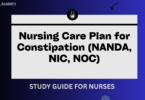Over 3 million adults in the U.S. live with schizophrenia, says the National Institute of Mental Health. This mental disorder is complex and needs a detailed care plan. Nurses are key in managing symptoms and helping patients recover. This guide explores how to create a good nursing care plan for people with schizophrenia.
Key Takeaways
- Schizophrenia is a complex mental disorder affecting over 3 million adults in the U.S.
- Nurses play a vital role in managing schizophrenia symptoms and supporting patient recovery
- A comprehensive nursing care plan addresses physical, psychological, and psychosocial needs
- Establishing a therapeutic relationship and promoting self-care are essential for patient well-being
- Continuous monitoring and evaluation ensure the care plan remains effective and tailored to the individual
Understanding Schizophrenia: A Complex Mental Disorder
Schizophrenia is a serious mental disorder that affects how a person thinks, feels, and acts. It’s a complex issue that can greatly change someone’s life and well-being.
Symptoms and Manifestations
The symptoms of schizophrenia vary a lot. They often include hearing voices or seeing things that aren’t there. People may also have strange beliefs that aren’t real.
They might have trouble speaking clearly or solving problems. This can make everyday tasks hard.
Causes and Risk Factors
The exact cause of schizophrenia is still a mystery. But it’s thought to be a mix of genes and environment. If someone in your family has it, you’re more likely to get it too.
Also, problems with brain chemicals, like too much dopamine, might play a part. Other risk factors include certain viruses, issues during pregnancy, and stress during important times in life.
The Importance of a Nursing Care Plan
A comprehensive nursing care plan is key in managing schizophrenia, a complex mental disorder. It offers a personalized, evidence-based way to meet the patient’s needs. This includes everything from medication adherence to psychosocial interventions. It helps in recovery and improves quality of life.
The importance of a nursing care plan for schizophrenia is clear. It gives a structured, tailored approach to care. Nurses can focus on the patient’s unique needs and goals. This way, they can create strategies to:
- Ensure medication compliance and monitor for side effects
- Implement psychosocial interventions to address cognitive, emotional, and behavioral challenges
- Promote self-care and independence through skills training and education
- Foster a therapeutic relationship and provide emotional support
- Coordinate care with the interdisciplinary team and community resources
The benefits of a nursing care plan for schizophrenia go beyond the patient. It helps prevent hospitalization, eases the load on families and caregivers. It also leads to better long-term outcomes and lower healthcare costs.
“A well-designed nursing care plan is crucial in empowering individuals with schizophrenia to manage their condition, achieve their goals, and reclaim their lives.”
The nursing care plan for schizophrenia is a key part of patient-centered care. It helps navigate the complexities of this mental health condition. It also supports the recovery journey.
| Key Components of a Nursing Care Plan for Schizophrenia | Benefits |
|
|
Assessing Schizophrenia Patients
Assessing schizophrenia patients is key to giving them the right care. It looks at both their physical and mental health. This helps doctors create a plan just for them. They check the patient’s medical history, symptoms, medicines, and how well they function.
Physical Assessment
Checking on schizophrenia patients includes many steps. Doctors look at their health overall. They take a detailed medical history, check vital signs, and do a full physical exam. Sometimes, they might also do blood tests or imaging to find other health issues.
Psychological Evaluation
Psychological checks are also part of the process. They help figure out the patient’s symptoms, how bad they are, and how they function. Doctors use tools like interviews, tests, and scales to understand the patient’s mental health.
| Assessment Component | Purpose |
| Medical History | Gather information about the patient’s past and current health conditions, including any history of mental illness, substance abuse, or other relevant medical issues. |
| Vital Signs Monitoring | Monitor the patient’s physical health, including blood pressure, heart rate, and temperature, to identify any potential physical concerns. |
| Diagnostic Interviews | Conduct in-depth interviews to assess the patient’s symptoms, functioning, and overall mental health status. |
| Cognitive Assessments | Evaluate the patient’s cognitive abilities, such as memory, attention, and problem-solving skills, to identify any cognitive impairments. |
| Psychological Scales | Utilize standardized scales and questionnaires to measure the severity of the patient’s symptoms and their impact on daily life. |
Assessing schizophrenia patients helps make a care plan just for them. By understanding their unique situation, doctors can help them recover better. This approach improves their overall health and well-being.
Developing a Holistic Care Plan
For people with schizophrenia, care needs to cover both their health and their mental well-being. Nurses create a detailed care plan. This plan balances medication management and psychosocial interventions. The goal is to improve the patient’s life quality and overall health.
Medication Management
Medicines are key in treating schizophrenia. Nurses are vital in managing these medicines well. They check if patients take their medicines, handle side effects, and work with the healthcare team. This ensures patients get the best treatment.
Psychosocial Interventions
Medicines help with the illness’s physical side. But, psychosocial interventions tackle the mental and social challenges. These can be therapy to manage symptoms, teaching families to support the patient, and training to live independently.
By combining medication management and psychosocial interventions, nurses make a strong schizophrenia care plan. This plan meets each patient’s specific needs and boosts their well-being.
| Medication Management Strategies | Psychosocial Interventions |
|
|
“A holistic approach to schizophrenia care, combining medication management and psychosocial interventions, is essential for optimizing patient outcomes and quality of life.”
Establishing a Therapeutic Relationship
Building a strong bond between the nurse and the schizophrenia patient is key for good care. Trust and open talk help create a safe space. This lets patients take part in their recovery.
To establish a therapeutic relationship with schizophrenia patients, show empathy, patience, and a real wish to understand them. Nurses should listen well, accept the patient’s feelings, and show they care deeply.
For building trust with schizophrenia patients, being consistent and reliable is vital. These patients often face thinking problems and social challenges. So, nurses must be a steady and predictable friend. Keeping promises, being on time, and offering a safe space without judgment helps build trust.
- Approach each patient with empathy and compassion
- Actively listen to the patient’s concerns and validate their experiences
- Maintain consistency and reliability in interactions
- Create a safe, non-judgmental environment that promotes open communication
- Collaborate with the patient to develop personalized care plans and goals
By focusing on the therapeutic relationship with schizophrenia patients, nurses can start a path to effective care. This care supports the patient’s recovery and overall health.
“The therapeutic relationship is the cornerstone of mental health nursing practice. It is the primary tool used to assess, intervene, and evaluate the effectiveness of nursing care.”
Promoting Self-Care and Independence
Living with schizophrenia is more than just managing symptoms. Nurses are key in helping patients develop self-care skills. This helps patients take charge of their health and live better lives.
Teaching coping skills is a big part of this. Nurses show patients how to handle stress, solve problems, and control their feelings. This helps patients deal with everyday life and feel in control of their mental health.
Encouraging patients to do daily tasks is also vital. Nurses help set goals and build confidence in tasks like cleaning, cooking, and taking medicine. This boosts independence and makes patients feel good about themselves.
Working together is key. Nurses and patients make plans to improve and grow. This teamwork builds trust and helps patients take part in their recovery. It also supports their self-care and independence.
Nurses can greatly improve the lives of schizophrenia patients by focusing on self-care and independence. This approach helps patients manage symptoms better and improves their daily life. It also gives them a sense of power and control, which is key for recovery.
Nursing Care Plan for Schizophrenia Patients
Creating a detailed nursing care plan for schizophrenia patients is crucial. It covers physical, psychological, and social health needs. Nurses use evidence-based practices and customize interventions for each patient. This helps patients recover and function better.
Identifying key nursing diagnoses is a vital part of the plan. These diagnoses include:
- Impaired reality testing
- Risk for self-harm or harm to others
- Ineffective coping
- Disturbed sensory perception
- Social isolation
The plan sets clear, reachable goals for the patient. Goals might help the patient:
- Understand what is real and what is not
- Stay safe from harm
- Find better ways to cope with symptoms
- Improve how they see the world
- Make friends and feel less alone
To meet these goals, the plan includes proven interventions. These include:
- Managing and watching over medications
- Using cognitive-behavioral therapy (CBT)
- Psychoeducation and support groups
- Activities to improve sensory perception
- Working together to solve problems and improve social skills
This detailed nursing care plan helps schizophrenia patients manage symptoms better. It also improves coping skills and social life. This leads to a better life overall.
“The nursing care plan for schizophrenia patients is a roadmap to recovery, guiding nurses in addressing the complex needs of this population and promoting holistic well-being.”
Family Education and Support
Caring for someone with schizophrenia can feel overwhelming. But, with the right family education and support, caregivers can help their loved ones recover. It’s key to give families the knowledge and tools to understand the condition and how to manage it. This includes learning about community resources for schizophrenia.
Involving Caregivers
It’s vital to include the patient’s family and caregivers in the care plan. This ensures a complete approach to treatment. By working together, nurses and families can create a supportive environment. This helps families feel informed and able to give the best care for someone with schizophrenia.
This teamwork can lead to better patient outcomes and help with taking medication as prescribed. It also makes the move from hospital to home care smoother.
Community Resources
Nurses should also help patients and their families find community resources for schizophrenia. These can be support groups, educational programs, or social services. They offer great help and support on the patient’s journey.
By using these resources, families can better handle the challenges of schizophrenia. They can get the tools and support needed to help their loved ones.
| Community Resource | Description |
| National Alliance on Mental Illness (NAMI) | A leading advocacy organization that provides education, support, and resources for individuals and families affected by mental health conditions, including schizophrenia. |
| Schizophrenia and Related Disorders Alliance of America (SARDAA) | A non-profit organization that focuses on raising awareness, promoting research, and supporting individuals and families impacted by schizophrenia and related disorders. |
| Local Support Groups | Support groups that offer a safe and supportive environment for individuals and families to connect, share experiences, and learn coping strategies. |
“Empowering families with family education for schizophrenia and connecting them to community resources for schizophrenia is essential for promoting holistic care and improving patient outcomes.”
Managing Challenging Behaviors
Caring for people with schizophrenia is complex because they might show behaviors like agitation, aggression, and troublemaking. Nurses are key in handling these behaviors. They make sure the patient is safe and keep the environment helpful for healing.
De-escalation is a big part of managing tough behaviors. Nurses need to know how to talk to patients in a calm way, keep eye contact, and listen well. By understanding the patient’s feelings and working together to solve problems, nurses can stop behaviors from getting worse.
Nurses also change the environment to help with tough behaviors. They make the space calm and organized, reduce too much sensory input, and provide safe spots for the patient to go when they need to.
When behaviors are tough, nurses use evidence-based techniques to step in safely. This might mean using verbal de-escalation, physical restraints only when needed, or giving as-needed medication to calm the patient and keep them safe.
Nurses have to balance managing behaviors with keeping the patient’s dignity and freedom. By building a caring relationship and involving the patient in their care, nurses help people with schizophrenia find ways to cope and take back control of their actions.
“Compassion and understanding are key when dealing with tough behaviors in schizophrenia. By working together with the patient, nurses can make a safe and healing place.”
Addressing Comorbidities and Complications
Schizophrenia is a complex mental disorder that often comes with other health issues, known as comorbidities. These can include substance abuse, metabolic disorders, and cardiovascular diseases. Nurses must treat these issues together to help patients fully.
Managing comorbidities in schizophrenia is tough because of possible medication side effects. The drugs used to treat schizophrenia can make conditions like diabetes, obesity, and heart disease worse. Nurses must watch patients’ health closely and work with other doctors to adjust treatments.
| Comorbidity | Prevalence in Schizophrenia | Nursing Interventions |
| Substance Abuse | Around 50% of individuals with schizophrenia |
|
| Metabolic Disorders | Up to 60% of individuals with schizophrenia |
|
| Cardiovascular Diseases | Approximately 2-3 times higher risk than the general population |
|
People with schizophrenia may also face cognitive impairments, social isolation, and a higher risk of suicide. Nurses must watch for and address these issues with special care. This includes cognitive rehabilitation, social skills training, and keeping an eye on mental health.
By tackling comorbidities and complications together, nurses can greatly improve the health and well-being of those with schizophrenia. This complete approach to care is key for the best outcomes for this group.
“Treating comorbidities in schizophrenia is crucial for improving overall health and quality of life for these individuals.”
Continuous Monitoring and Evaluation
Managing schizophrenia needs a flexible and changing nursing care plan. It’s key to keep checking on the patient’s progress to see if what we’re doing works and if we need to change. We look at the patient’s symptoms, how they react to medicine, their daily life, and their overall health.
Nurses keep a close eye on patients with schizophrenia to spot patterns and changes. This helps us make changes to the care plan when needed. We work with the healthcare team to check how the patient is doing, see if the medicines are working, and handle any new problems. Checking in often also helps us see how well the mental health support is working, so we can make it better.
It’s important to work together when checking on the patient. This means the patient, their family, and the healthcare team all have a say. This way, the care plan stays focused on what the patient really needs and wants. By always watching and checking how the patient is doing, we make sure the treatment is working well and changing as the patient’s needs change.
FAQ
What is the importance of a nursing care plan for schizophrenia patients?
A comprehensive nursing care plan is key for managing schizophrenia. It covers the patient’s many needs, like taking meds and getting psychosocial help. This helps the patient recover and live better.
What are the key components of a holistic nursing care plan for schizophrenia patients?
A holistic nursing care plan for schizophrenia includes managing meds and psychosocial help. It also means building a strong relationship with the patient. Plus, it encourages self-care, involves family, and looks at other health issues.
How can nurses establish a therapeutic relationship with schizophrenia patients?
Nurses build a strong bond with schizophrenia patients by gaining trust and talking openly. They create a safe space that helps the patient take part in their care.
What role do family and caregivers play in the nursing care plan for schizophrenia patients?
Family and caregivers are key in caring for schizophrenia patients. Nurses teach them about the condition and how to manage it. This helps the family support the patient’s recovery.
How do nurses address challenging behaviors in schizophrenia patients?
Nurses use proven methods and calm strategies to handle tough behaviors in schizophrenia patients. This approach keeps the patient safe and respects their dignity in a healing setting.
How do nurses monitor and evaluate the effectiveness of the nursing care plan for schizophrenia patients?
It’s vital to keep checking how well the care plan is working. Nurses watch the patient’s progress, make changes as needed, and work with the healthcare team. This ensures the patient keeps getting better.










